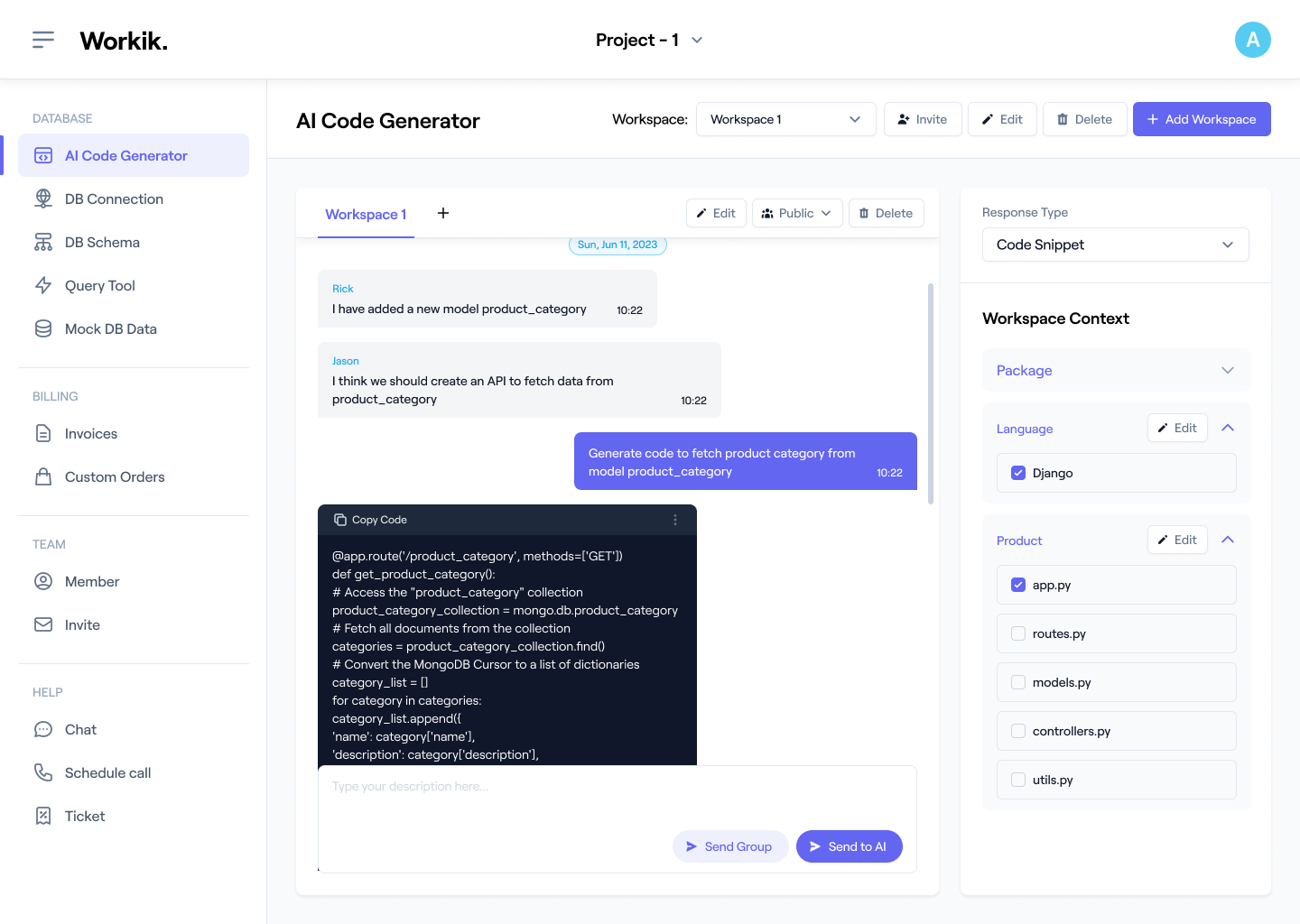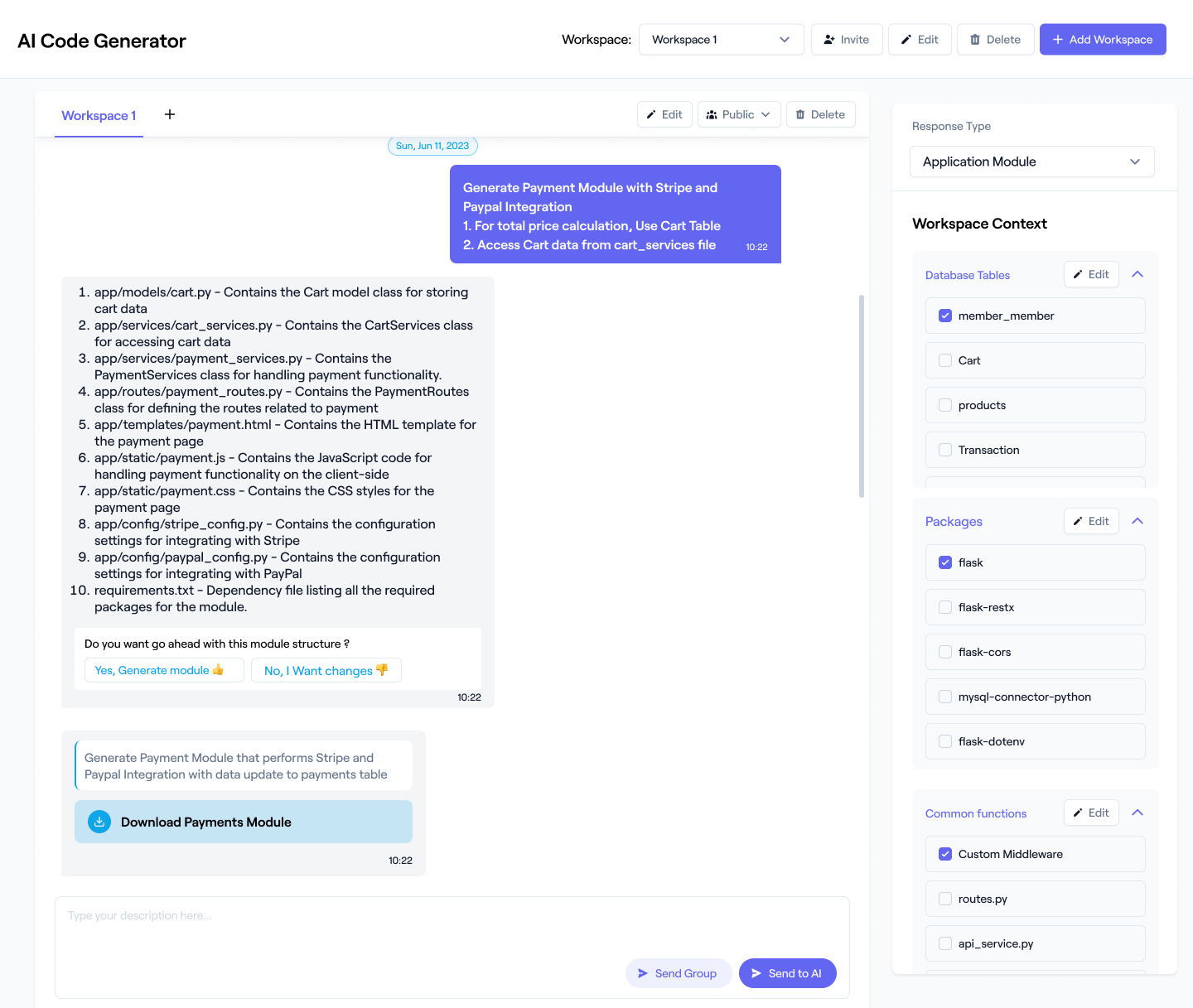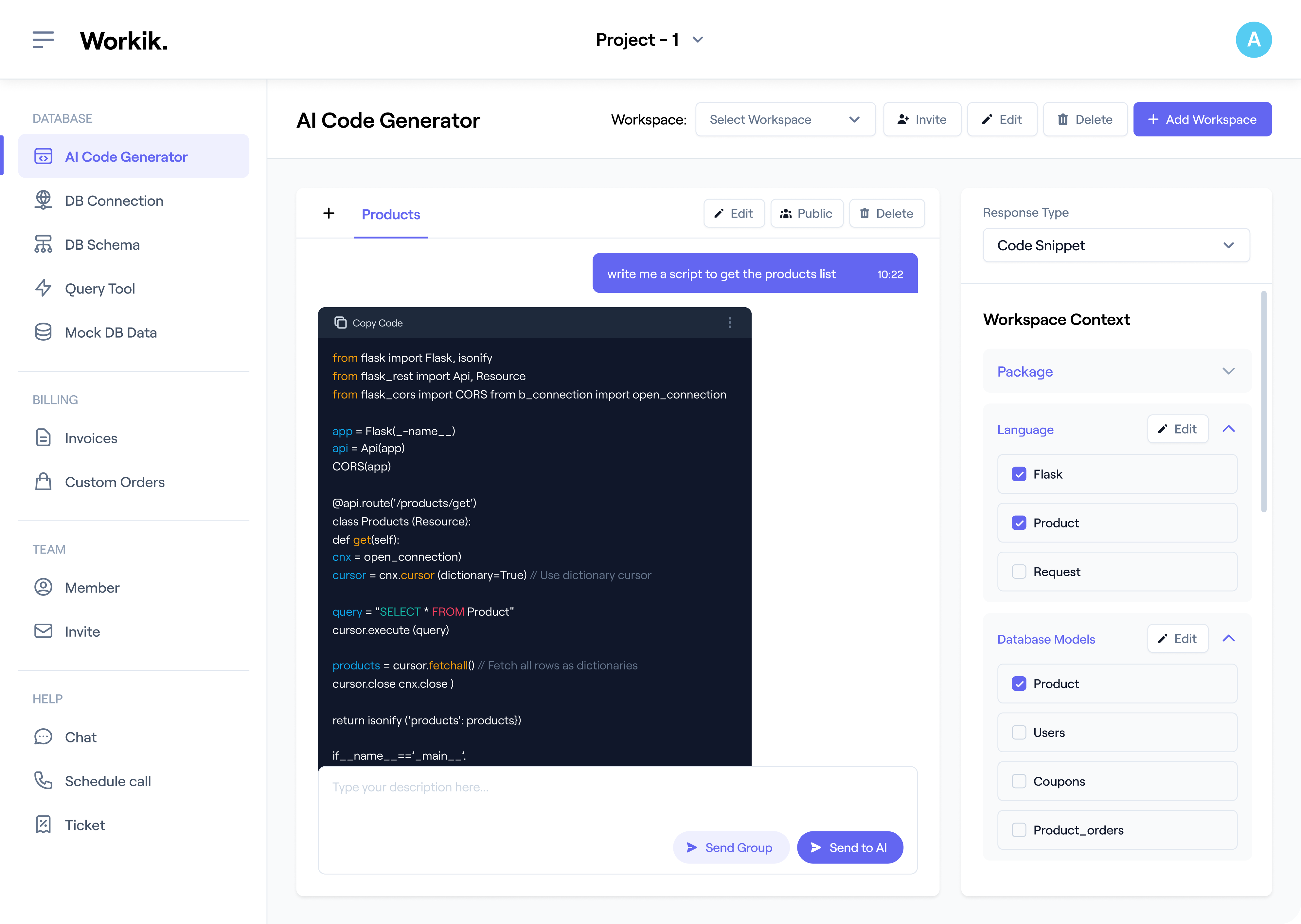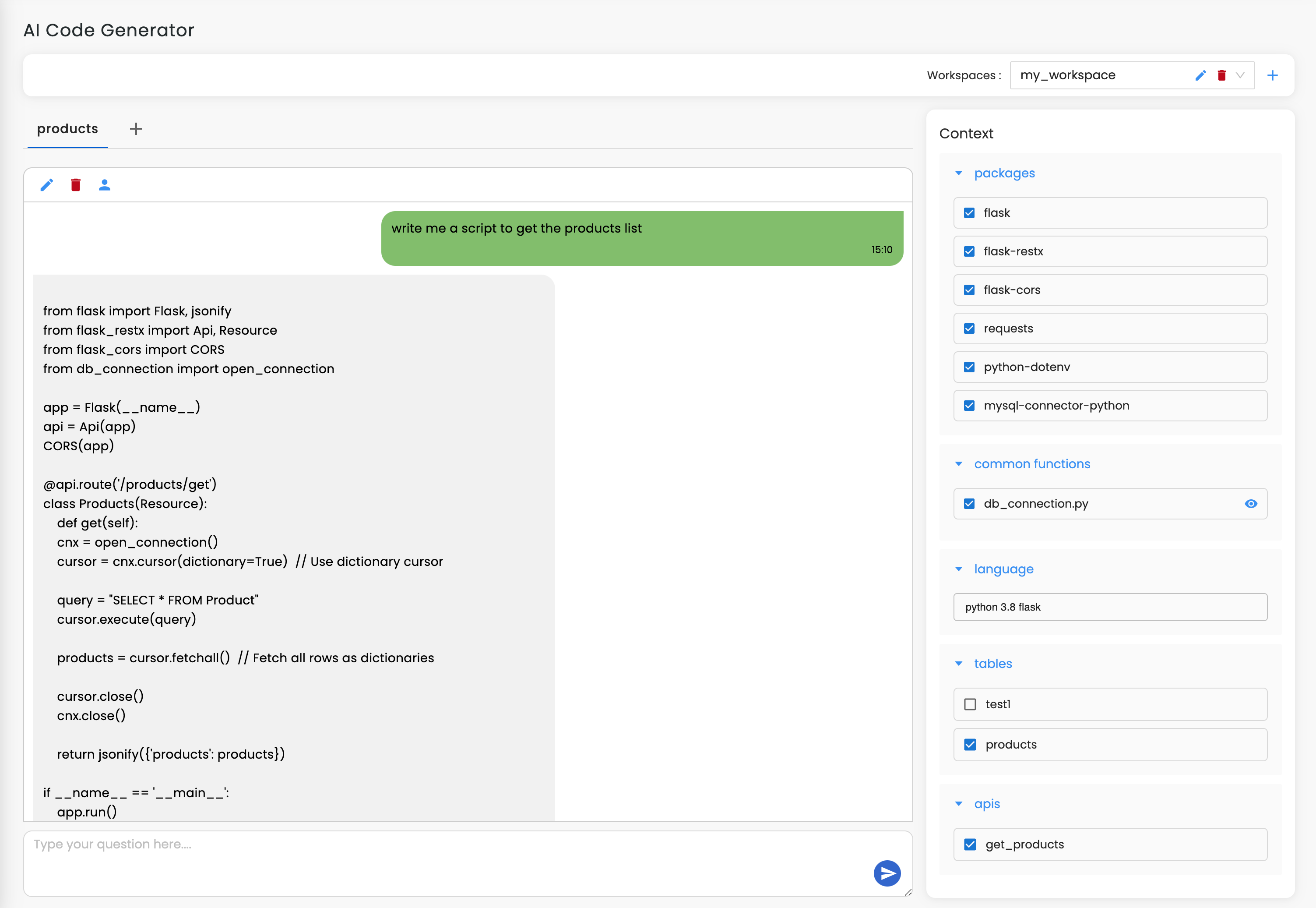
Join our community to see how developers are using Workik AI everyday.
Features

Generate Accurate Expressions
AI generates precise cron expressions for backups & batch processing, integrating with crontab on Linux or Kubernetes CronJobs.

Validate Cron Expressions
AI validates cron expressions before execution, supporting integration with Jenkins pipelines and tools like cronchecker.

Automate Complex Workflows
Automate backups and database cleanups with advanced cron expressions, integrating Ansible or Docker for seamless execution.

Streamline CI/CD Pipelines
Generate cron expressions for automated deployments or tests in GitLab, AWS Lambda, or other CI/CD tools using AI.
How it works
Create a free Workik account in seconds and log in to access the AI-powered cron job expression generator.
Input your scheduling details like minutes, hours, days, or specific times. Customize the job frequency for tasks like backups, database cleanups, or automated deployments.
Let AI generate the cron expression based on your input. Validate the expression to ensure accuracy using built-in tools or integrate with CI/CD pipelines like Jenkins or GitLab.
Use the generated cron expression to automate tasks in environments like Linux crontab, Kubernetes CronJobs, or AWS Lambda for seamless job execution.


Expand


Expand


Expand


Expand


Expand


Expand


Expand


TESTIMONIALS
Real Stories, Real Results with Workik
Workik’s AI-generated cron expressions automated our CI/CD tasks seamlessly, eliminating manual scheduling errors.

Shannon Fay
Senior DevOps Engineer
Automating database jobs with cron expressions was a breeze. Huge time-saver!

Veronica Carney
Backend Developer
Workik’s cron validation ensures flawless scheduling every time.

Adrian Joseph
Full Stack Developer
What are some popular use cases of Workik’s AI-powered Cron Job Expression Generator?


Some popular use cases of Workik’s AI-powered Cron Job Expression Generator include but are not limited to:
* Automating system backups and database maintenance tasks.
* Scheduling log rotations for system cleanups.
* Automating CI/CD pipelines for deployments, test runs, and monitoring.
* Managing cron jobs in containerized environments like Kubernetes CronJobs.
* Scheduling tasks in serverless architectures such as AWS Lambda.
What context-setting options are available in Workik’s AI for Cron Job Expression?


Workik offers several context-setting options to tailor Cron Job Expression, allowing users to:
* Set time intervals using cron syntax for minutes, hours, days, and more.
* Define task types like system maintenance, backups, or script automation.
* Integrate with CI/CD pipelines (Jenkins, GitLab, GitHub Actions) for deployments and testing.
* Schedule distributed jobs in Kubernetes CronJobs or AWS Lambda for cloud automation.
* Add conditional triggers based on system events or job outcomes.
* Set time zones for global scheduling.
* Enable error handling with retries and alerts via Slack or email.
Can I use the AI Cron Job Expression Generator for complex schedules?


Yes! Workik’s AI handles complex cron schedules effortlessly, whether you need jobs to run every 15 minutes, on specific weekdays, or at irregular intervals like the second Tuesday or last day of the month. This is perfect for tasks like staggered backups, automated testing, or maintenance windows.
How do I ensure my cron jobs work correctly?


Workik includes a built-in validation tool that tests cron expressions before deployment. You can also preview execution times and integrate with Jenkins, GitLab, or AWS Lambda to monitor job performance and prevent scheduling errors in CI/CD environments.
Can Workik handle error reporting for cron jobs?


Yes, Workik integrates with tools like Slack or email to send failure alerts and retry jobs automatically. For example, if a backup fails, you get notified immediately and a retry mechanism can be triggered, ensuring minimal downtime.
How does AI improve scheduling efficiency?


AI optimizes cron expressions for better resource management, especially in cloud environments like Kubernetes or AWS. Schedule tasks during off-peak hours or stagger multiple jobs to avoid system overload, saving costs and boosting performance.
Generate Code For Free

Cron Job Expression: Question & Answer
A Cron Job Expression is a string that schedules automated tasks based on five fields: minutes, hours, day, month, and weekday. It automates repetitive tasks like backups or system updates in environments like Linux crontab, Kubernetes CronJobs, and AWS Lambda.
Popular languages and platforms used with cron job expressions include:
Languages:
Bash, Python, Shell scripting
Scheduling Tools:
Linux crontab, Kubernetes CronJobs, AWS Lambda
CI/CD Platforms:
Jenkins, GitLab CI, CircleCI
Cloud Platforms:
AWS, Google Cloud Scheduler, Azure Functions
Version Control:
GitHub, GitLab, Bitbucket
Database Tools:
MySQL, PostgreSQL
Popular use cases for cron job expressions include but are not limited to:
Automating Backups:
Schedule regular database and server backups.
CI/CD Integration:
Automate tests, deployments, and builds in Jenkins or GitLab.
Log Rotation:
Rotate logs and clean temporary files to manage disk space.
Cloud Automation:
Schedule tasks for AWS Lambda or Google Cloud Functions.
Infrastructure Monitoring:
Trigger health checks and reports in Kubernetes CronJobs.
Database Maintenance:
Automate database optimization, indexing, and cleanups.
Career roles in Cron Job Expressions include DevOps Engineer, SRE, System Administrator, Cloud Engineer, and DBA, focusing on automating infrastructure, scheduling tasks, and optimizing workflows.
Workik AI streamlines the use of cron job expressions by:
Automating Cron Generation:
Generates precise cron expressions based on custom schedules.
Validating and Testing:
Ensures cron jobs run accurately in Jenkins, GitLab, or other environments.
CI/CD Integration:
Seamlessly adds cron jobs to GitLab, Jenkins, and CircleCI pipelines.
Cloud Task Scheduling:
Creates cron jobs for Kubernetes CronJobs or AWS Lambda for serverless workflows.
Optimizing Resources:
Schedules jobs during off-peak hours to minimize resource strain.
Handling Errors:
Set up alerts and retries for failed cron jobs using Slack or email notifications.
Explore more on Workik
Get in touch
Don't miss any updates of our product.
© Workik Inc. 2026 All rights reserved.

